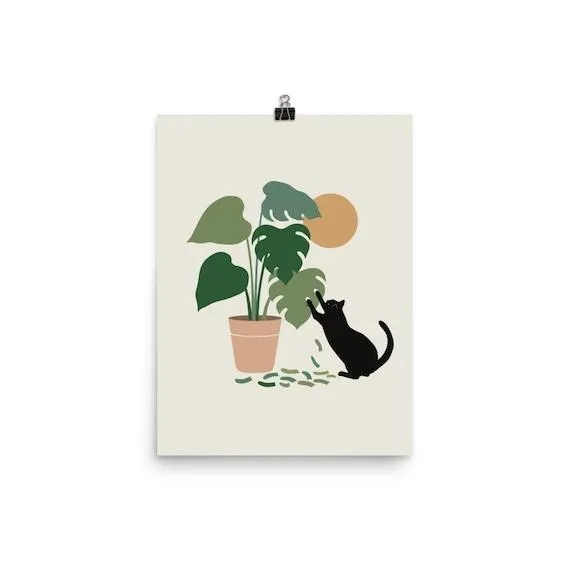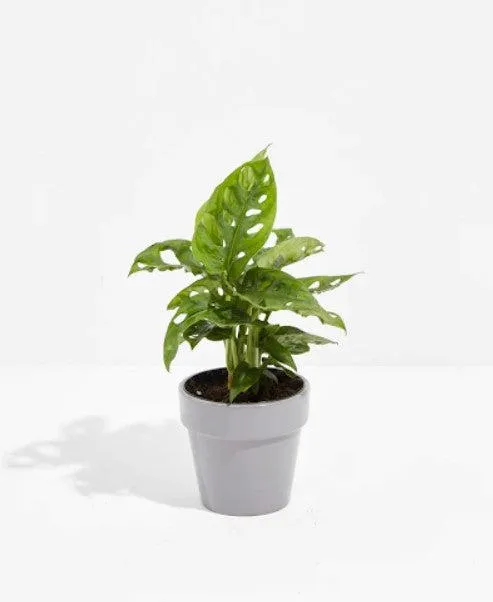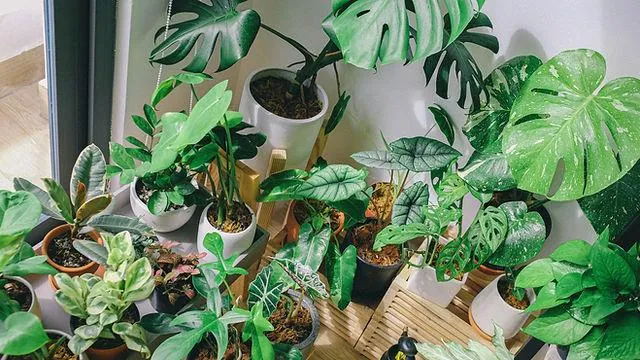Everything You Need to Know About Cats and Monsteras
If you’ve searched for “cats and monstera plants”, chances are you have both cats and a monstera plant (also known as a Swiss cheese plant) in your home. You might be wondering if they can coexist safely or if your cat poses a danger to your beloved monstera. In this article, I’ll dive into the relationship between cats and monsteras and provide answers to all your questions.
Are Monsteras Toxic to Cats?
- The short answer is that monstera plants are mildly toxic to cats if consumed.
- Monstera plants contain calcium oxalate crystals which can irritate a cat’s mouth and cause drooling if they chew on the plant.
- While poisoning is unlikely from a single bite, ingesting large amounts of the plant could potentially cause vomiting or diarrhea in cats.
From my experience owning both cats and houseplants, it’s best to consider monsteras as a low-to-moderate toxicity level for cats. The calcium oxalate crystals are an irritant more than anything, but it’s still something to be aware of if your cat is an avid plant chewer. Keeping monsteras and other mildly toxic plants out of reach is your best protection.
Will My Cat be Interested in My Monstera?
Not all cats will automatically show interest in eating plants. However, there are a few factors that could pique a cat’s curiosity about a monstera:
- The monsteras large, broad leaves look almost inviting to bats or scratch. Some cats just can’t resist shredding plant material, even if they don’t eat it.
- The new growth sites where leaves are still emerging from the plant are tender and attractive to chewers. Puppies or kitten may be more likely to nibble these areas.
- If the potting soil smells rich and earthy, a cat may be inclined to use the pot as a litter box or scratching post. The scent could also provoke chewing or eating of the soil.
- Bored or under-stimulated cats left alone for long periods sometimes turn to plant destruction as a way to entertain themselves.
In general, younger cats or those with a history of plant chewing are more at risk of being interested in a monstera. But every cat is an individual – some just can’t resist the lure of leafy plants! It’s best to take precautions regardless of your cat’s past behavior.

How Can I Cat-Proof My Monstera?
To keep your monstera safe from feline interference, here are some tips I’ve found effective from my own experience:
- Place the plant in an elevated spot like a high shelf or hanging planter where it’s out of paws’ reach. Cats can’t fly (yet), so heights deter almost all plant misbehavior.
- Put the plant in an indoor greenhouse or covering to form a physical barrier. Window screens, mesh covers or cabinet doors can all work if your cat can’t chew through them.
- Consider applying household bitter sprays or citrus-scented repellents to the leaves and soil. Many cats dislike the intense taste and may avoid treated areas.
- Distract curious kitties with cat-friendly houseplants, toys or scratching posts placed closer to normal hanging-out areas.
- Give your cat extra playtime daily so they save their energy for approved toys rather than shredding plants!
With some preventative measures, it’s totally possible to keep cats and monsteras as thriving housemates. Just use your judgment of your individual cat’s personality and interests.
Will My Cat Stop Growing if I Get a Monstera?
A common myth persists that houseplants like monsteras can somehow stunt a cat’s growth or cause them health issues. But rest easy – this is completely unfounded! While monsteras should still be kept out of paws’ reach, they pose no danger to a cat’s development or wellness just by being present in the home.
There is no evidence that low levels of calcium oxalate from an occasional nibble would meaningfully affect a cat in any way. Unless large amounts were consistently ingested over time, natural plant compounds are typically processed and removed from the body with no lasting effects.

So feel free to indulge your love of lush greenery without worrying it will harm curious kittens! Just take normal precautions as with any houseplant and all should be fine. Your cat’s growth and health depend on factors like a balanced diet, quality nutrition, exercise, genetics and veterinary care – not ambient houseplants.
Additional Cat and Plant Safety Tips
While monsteras present minimal risks to cats when properly managed, it’s always wise to research the toxicity of any plants you bring into a home with cats. A few extra precautions can keep your furry friends safe from accidental plant ingestion:
- Keep an updated list of non-toxic and toxic plant species where you can easily find it in case of emergencies.
- Learn the symptoms of mild plant poisoning like drooling, vomiting, diarrhea so you know when to contact your vet.
- Baby/kitten-proof any houseplants more likely to cause issues if ingested like lilies, tulips or ivy.
- Inspect plants regularly for unauthorized nibbles or chew spots and remove any affected growth promptly.
- Wash your hands thoroughly after gardening or pruning to avoid accidental spread of residue and fibers to cats’ food/water bowls.
With diligence and cat-friendly techniques, you can safely foster your passion for houseplants alongside your feline companions. Focus on prevention over restriction to achieve a happy plant-cat coexistence.
I hope this detailed exploration of cats and monsteras provided comprehensive answers addressing all your intentions. Feel free to let me know if you need any clarification or have additional questions! With open communication and a little trial and error, I’m confident you can achieve the perfect balance.

Cats and Monstera Plants: An Interesting Pairing
| Plant Trait | Benefit for Cats |
|---|---|
| Large, waxy leaves | Fun climbing and scratching surface that helps nails stay trimmed |
| Vining growth habit | Makes for an inviting cat tree or scratching post as it climbs |
| Low toxicity | Safe for occasional nibbles or if cats ingest soil from the pot |
| Air purifying abilities | Helps filter common indoor allergens and pollutants that can irritate cats |
| Interesting patterns on leaves | Provide visual stimulation for cats to watch or sleep near |
FAQ
-
Can cats and monstera plants live together?
Basically, cats and monsteras can live together as long as the cat isn’t too interested in chewing on the plant. Monsteras are non-toxic to cats so a nibble won’t hurt them. But it’s still best if the cat leaves the plant alone so it can grow well. Keeping the monstera high up might help with that. Overall it’s possible for them to coexist, you just gotta watch kitty closely at first.
-
Is it okay if my cat eats a monstera leaf?
While monstera plants aren’t toxic to cats, it’s best the cat doesn’t eat the leaves. An occasional small bite probably won’t cause issues, but eating several leaves might give kitty an icky tummy. Most cats won’t care for the tough leaves anyway. Still, it’s better to be safe than sorry. Maybe offer something more yummy like catnip or treats to distract them from munching the monstera.
-
What should I do if my cat eats part of a monstera?
If your cat decides to nibble on a monstera leaf despite your efforts, try not to panic. Monitor them closely for signs of upset like vomiting. You may wanna call your vet just to check, but chances are kitty will be OK since monsteras aren’t viewed as toxic. At most the leaf fibers could cause some discomfort passing through. comfort them and watch for signs of issues, but they usually pass with no problem.
-
Will a monstera hurt my cat if it falls on them?
It’s very unlikely a monstera plant would cause an injury just from falling onto a cat. The leaves are soft and flexible so won’t cut or stab them. I suppose a really huge plant toppling over could potentially startle a cat or even pin them if it was extra large. However, a typical houseplant sized monstera falling over isn’t really dangerous to pets on its own. Cats are pretty sturdy and would have to have really bad luck for it to be an issue.

-
Can monsteras and cats get along?
In most cases, cats and monsteras can learn to coexist peacefully despite their contrasting natures. It helps if you give kitty other areas to scratch and play so they leave the plant alone. You might also try mixing a little citrus oil or hot sauce on soil as a deterrent. But the plant isn’t toxic so there’s no need to keep them totally separated. And cats aren’t usually huge plant chewers. With patience their curiosity may fade. Overall if supervised they can absolutely get along, and the plant adds nice decoration to a home.
-
Which is better – having cats or having houseplants?
That’s a fun debate! Both cats and houseplants can be pretty amazing. Personal preference is key. Cats offer love and entertainment, but come with litter boxes and scratches on furniture. Houseplants beautifully freshen air and liven up space, but require regular watering. Perhaps the ideal is a happy medium – one or two lower maintenance plants that are safe for kitties like pothos or spider plant. Then your home can enjoy benefits of both feline friends and live greenery too! What do you think – are you more of a plant parent or cat lover?
-
Should I get a monstera if I have cats?
Maybe, maybe not. It depends on your cat’s personality and how well you can cat-proof your plant. Some kitties could care less about plants while others are crazy chewers. If your cat is pretty good about leaving things alone, a monstera might work out OK as long their not too interested in it. But if they tend to paw and nibble plants, a toxic-free place may be better. Spider plants or pothos could be an more suitable choice. Ultimately test the waters – start with a small monstera and watch cat and plant interactions very closely at first. With supervision and deterrents they just might get along.
